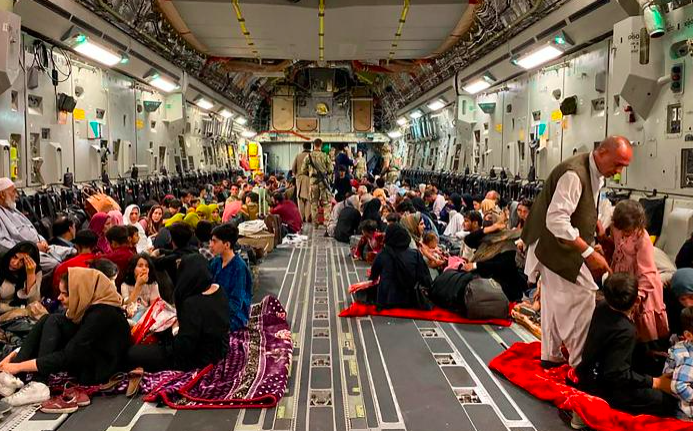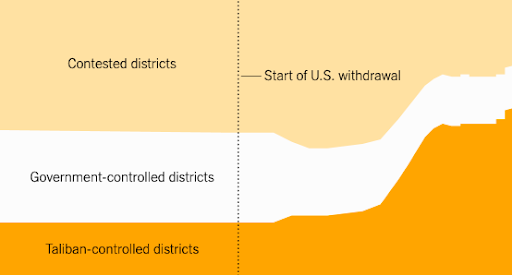Xinxin Fang ‘24
The withdrawal of US troops from Afghanistan is a topic of conversation throughout the nation, and some EA students have formed opinions, while others are unaware of the issue at hand.
To describe briefly the situation, over the past two decades, the United States spent trillions in training soldiers to fight the Taliban in Afghanistan. After two peace treaties and a change of presidency, President Joe Biden ordered the complete withdrawal of U.S. troops by April 31, 2021, which finished on April 30, 2021.

Photo courtesy of Shakib Rahmani, cnn.com
However, a statement by Gen. Mark Milley notes that “There was nothing that I or anyone else that indicated a collapse of this army and government in 7 days [following the departure of the United States]”, according to NBC news. Austin Bouvel ‘24, says, “I think the fact that it was taken over so quickly, shows how we should not have even been there. We supplied them for 20 years with billions of dollars and they did nothing with it.”
Following this quick withdrawal, the U.S. military most likely left behind tens of billions of dollars worth of equipment. As mentioned in USA Today, Loren Thompson, a military analyst, notes that “the ability of the Taliban to operate and maintain them without outside help is modest.”
“The issue stems deeper than blaming one specific side. You can find faults on both sides,” states Jaden You ‘23. Luka Filipovski ‘25 agrees,“[The withdrawal from Afghanistan] was a hasty decision that probably shouldn’t have been made as quickly as it was.”
On August 12th, Biden addressed the situation in Afghanistan and established that withdrawing troops was the right choice, saying “We cannot fight and die in a war that Afghan forces are not willing to fight for themselves” per the New York Times.

However, Sami Sadat, a General of the Afghan National Army’s most elite fighters, believes the “Afghan Army lost its will to fight […] because of [..] the disrespect and disloyalty reflected in Mr. Biden’s tone and words over the past few months” according to the New York Times. Sadat mentions a lack of leadership from the U.S. and Afghans. During a 2016 visit to the Kandahar military training center, Lieutenant Hayatullah Frotan reported on the corruption of the system. He explained that leaders not only pocketed soldier’s pay, but some were illiterate or could not count.
Also mentioned in the New York times, Sadat explains that Trump’s original withdrawal signified an “expiration date of American interest in the region,” and Biden’s accelerated withdrawal created a firm deadline. The Afghan’s heavily required U.S. support, but as brought up by Bowman from NPR news, “Officials had the same thing to say: The Afghan army is getting better every day. They are fighting hard. They are leading.”
Sadat believes the war was a military defeat derived from political failure. Accordingly, Justin Lam ‘23, says, “In an ethical sense, since the U.S. is the most powerful country in the world, they should maintain justice in the world. I think it’s both of their faults, it’s the U.S.’s fault for not monitoring the Afghan’s leaders properly, but the same can be said for the Afghans monitoring their own leaders.”
There are programs and groups across the world that are working on supporting those in Afghanistan who continue to struggle against the Taliban. The International Rescue Committee or the United Nations Humans Rights committee seek donations to support their work in Afghanistan, and International Media Support – a Danish media company – calls for contributions in aiding vulnerable journalists to Taliban violence. Other campaigns on GoFundMe focus their efforts on locals to help exposed families.